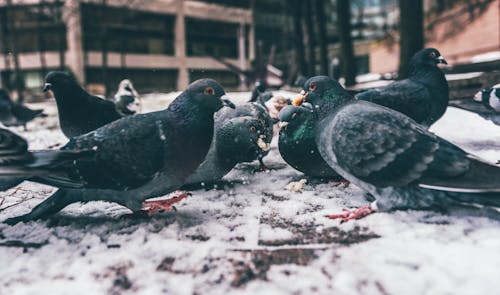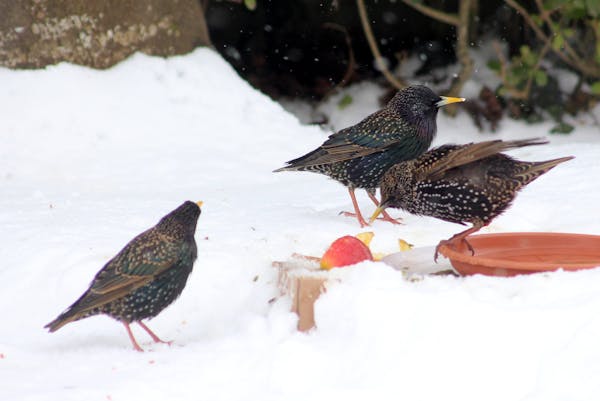Here Are Five Tips for Helping Birds Get Through Winter
With the arrival of winter, many birds must worry about having sufficient food to survive the frigid months. With natural food sources such as insects, berries and seeds dwindling, it falls to bird lovers to avail them of steady 24 hour access to supplemental feed.
Providing appropriate food and keeping your garden bird-friendly will help sustain your feathered friends through the winter. Here are some really helpful tips on feeding garden bird in winter.
Provide High Energy Foods
During winter, birds require fats and energy rich foods to keep them warm. Here are the top selections:
Suet and Fat Balls:
Suet cakes or fat balls are a fantastic source of energy. They are simple to hang in feeders or trees and appeal to a wide range of bird including woodpeckers, tits and starlings.
Peanuts:
Offer unsalted shelled peanuts for protein and fat. To protect seed from being emptied by ravenous larger bird, and also to allow smaller bird to eat in relative safety use a mesh feeder.
Sunflower Seeds:
Black oil sunflower seeds have a high nutritional value and thin shells that bird can easily eat. Finches, sparrows and cardinals favor them.
Mealworms:
Dried or live mealworms make for a fantastic protein source for insect-eating birds like robins and wrens.
Keep Feeders Clean and Full
Because of that, it’s a good idea to regularly clean your feeders to reduce the risk of spreading any diseases among birds. To remove bacteria and mold, use warm water with soap, rinse very well.
It’s also critical to keep feeders filled, especially during the snow or frost as bird will be dependent on these food sources.
Offer Fresh Water
Food is not the only thing a winter day barely holds no warm water is. Bird that need drinking water and water for bathing to keep their plumage in good condition. During freezing temperatures:
Use Heated Surfaces:
Giving Fresh Water in Winter: In winter, bird need fresh water too.
Break Ice Daily:
If a hot bath is out of reach, regularly check water sources and break up any ice. Add warm water to slow the freezing process.
Use Different Feeding Stations
Various birds favor varying heights and eating practices. Using feeding stations on different levels will help attract a variety of birds
Ground Feeders:
Scatter seeds on the ground for doves and sparrows, or even use a ground feeder.
Hanging Feeders:
Ideal for perching birds such as finches and tits.
Platform feeders:
Best for larger birds like robins and blackbirds.
Protect Birds from Predators:
Bird feeding may attract predator species like cats or hawks. To keep garden birds safe:
Feeder Placement:
Put feeders close to shrubs or trees so the birds can escape quickly but not so close that they can be ambushed easily by predators.
Use Baffles:
Baffles are barriers, often physical, which you can set up around feeder poles to make it more challenging for predators, such as squirrels or larger animals, to obtain food.
Avoid Harmful Foods
Certain foods can be dangerous or lethal to birds. Do not feed them these
Avoid salty or sugary food:
Giving birds processed foods like bread, chips, or sweets can cause health problems because these foods provide little nutrition.
Milk And Dairy Products:
Birds cannot digest milk and every dairy can be harmful.
Cooked Food Scraps:
can attract unwanted pests and spoil in cold environments.
Create Natural Shelter:
Besides food, birds need housing to endure cruel winter weather. Provide natural cover by
Evergreen Shrubs, which provide winter windbreaks and snow protection year around.
Leaving Brush Piles:
Collect branches and leaves into a pile to form a natural haven for bird.
Providing Nesting Boxes:
Nesting boxes are often used as breeding shelters in the spring, but can also provide winter roosting sites.
Watch and Tweak Eating Habits
Watch the bird for which foods are most appealing, and proffer accordingly.
Certain seeds will attract certain species, and knowing which seeds attract which species can be a significant help.
Conclusion
Gardening feeding birds during the winter months is a great way to help wildlife and enjoy the beauty of your garden.
So feed them with high-energy foods, clean water, safe feeding stations and natural shelters, and help garden bird thrive over the colder months.
With some ongoing care, you won’t just help them survive indoors, you’ll be creating a vibrant, colorful, winter sanctuary in your own backyard.
